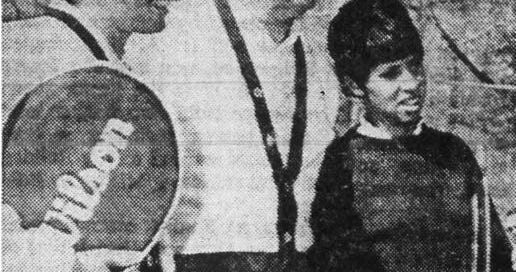The man who brought Billie Jean to town
Frank Brennan coached Billie Jean King -- and made her part of his family
He never took a tennis lesson himself. He taught the sport only in his spare time, while working for the Post Office to support his wife and 10 kids. He’d never been to Wimbledon, let alone coached anyone who had.
Yet Frank Brennan helped coach Billie Jean King – a pudgy 15-year-old in dorky rhinestone glasses when first they met -- to the Tennis Hall of Fame.
At their first encounter, Brennan told the girl that someday she’d be No. 1. “Nobody had ever said anything like that to me before,’’ King would recall. “I was so taken aback I just stared at him.’’
Her unlikely mentor lived on Greenwood Drive in Fair Lawn, in a small post-war Cape that housed his rambunctious brood – and, for several weeks each summer from 1959 to 1966 -- Billie Jean herself.
Big family, small house
Frank Brennan introduced himself to Billie Jean Moffitt in 1959 at a tournament in South Orange. He liked how she hit the ball and how she played – aggressively.
But he told her she’d never reach the top if she continued to use nylon racket strings. He could get her natural gut strings, which afforded more spin and better control. In fact, he could restring both of her rackets that night.
According to Brennan’s son, Frank Jr., the girl refused to let the rackets out of her sight. But she agreed to drive with this stranger and his 16-year-old son to their house, which had several racket stringing machines in the basement.
When they got to the house, the younger Brennan girls jumped up on Billie Jean’s lap, and at dinner their mother Lillian treated her like a member of the family. “I was accustomed to orderly dinners at my home, but mealtime at the Brennans was an Irish-American free for all.’’ she recalled years later. “The ‘Amen’ at the end of grace was like a starting pistol. Silverware flashed, crumbs flew.’’
In those days amateur tennis players often stayed with members (usually well-off with big houses) of the private clubs at which most tournaments were held. But Frank Jr. says Billie Jean asked to move in with the Brennan family. And for years Billie Jean, who lived in Southern California, stayed with the Brennans during the summer tournament circuit that led to the national championships at Forest Hills.
“The Brennan family would become an extension of my own.’’ she wrote in her 2021 autobiography, All In. Her coach felt the same: “She’s our oldest kid,’’ he told The Record in 1966. “He really loved Billie Jean,’’ Frank Jr. recalls. “He thought she walked on water.’’
The man Billie Jean called “Mr. B.’’ had grown up in Paterson near a private tennis club where, between shifts as a groundskeeper, he learned to play. In 1937, when he was 23, he won the state title.
But there was little money in tennis at the time. Brennan got a job with the Post Office and gave lessons after his shift ended in mid-afternoon.
Despite his lack of credentials, Brennan became the first coach to travel with Billie Jean to some of her events and offer advice. Once, when she was struggling with her serve, he suggested a higher toss; “It’s only a little thing, but it made all the difference,’’ Brennan later told the New York Times.
His contributions weren’t all about technique. King recalled in All In: “His chats with me about strategy helped sharpen my game.’’
Then, she continues:
“But he could also be blunt. He (once) made the searing offhanded remark to me that, ‘you’ll be good because you’re ugly,…’ We were seated at the dinner table when he said it, and Lillian and a few of the kids told him, ‘That’s horrible!’’’
The only thing more remarkable than Brennan’s alleged insult is that she apparently forgave it: “I got past the remark after I got to know Frank better. ‘’
Billie Jean won the Wimbledon doubles in 1961 and 1962, but a major singles title eluded her. In 1965, after blowing a lead and losing in the final at Forest Hills, she told Brennan “I’m so upset I can’t breathe.’’ But as they talked, “I realized something that would change my life: the difference between a champion and the rest of the field is having the ability to lift your game when you’re under the greatest pressure. … As I finished my walk with Frank, I said, ‘I’m going to win Wimbledon next year.’’’
She did.
And, as always, she stayed that summer with the Brennans – this time with her new husband, Larry King (no relation to the TV interviewer).
In 1967 the Brennan family moved to Upper Saddle River, where Frank ran one of New Jersey’s first indoor tennis clubs.
Later that year Frank and Lillian were at Wimbledon, watching King and Rosie Casals play a semi-final doubles match on Centre Court, when Frank collapsed with a heart attack.
Told only after the match, Billie Jean rushed to the hospital with flowers. She was back 24 hours later, still in her soggy tennis dress: “I won the triple,’’ she told him – singles, doubles and mixed doubles. “I won it for my coach,’’ she told reporters.
What followed is, in light of athletic superstar behavior today, hard to imagine. While Brennan recovered in the hospital with Lillian by his side, the Kings went back to New Jersey to help Frank Jr. and his wife run the Brennan household. Larry even managed the tennis club.
With the advent of the women’s professional tennis tour in late 1960s, King and Brennan worked less closely. He was never paid to coach her as an amateur, and now he had private lessons, the club and, starting in the late ‘60s, a summer tennis camp in Mercersburg, Pa.
All thrived in part because of King’s aura. “She’s a millionaire,’’ he told a reporter, ‘’but she keeps plugging me.’’
The Battle of the Sexes
In the early 1970s Bobby Riggs -- former U.S. national champion, epic tennis hustler and performative male chauvinist – challenged King to a match that he said would establish the superiority of his sex.
She had been playing against males all her life, including some sessions at the Radburn courts near the Brennan home. But earlier that year Riggs had badly beaten Margaret Court, the world number one, seemingly by psyching her out.
Brennan had two pieces of advice: Don’t rally with Riggs from the baseline as Court had, and – because slower or older players compensate by hedging toward the open side of the court – hit behind him. She did – 50 times, by Brennan’s count. Her victory made her a global feminist hero.
Frank Brennan died in 1986, at the age of 72. His son Frank went on to coach women’s tennis at Stanford University for 21 years, winning 10 NCAA team championships.
Fittingly, it was King’s Congressional testimony that virtually ensured passage in 1972 of Title IX, legislation that made women’s college athletic programs like Stanford’s possible. And today, Frank Brennan’s grandson Frankie is the Stanford women’s coach.
Frank Brennan Jr. thinks fondly of those days on Greenwood Drive, with so many people in so little house – including the girl who’d become one of the world’s most famous female athletes.
“Billie Jean was such a regular person and so much a part of our family,’’ he says. “She was on her way to becoming Billie Jean King. But to us, she was just Billie Jean.’’





